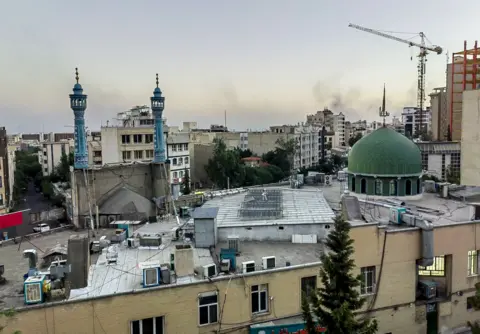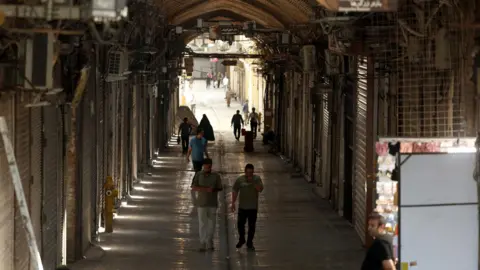Special correspondent, BBC Persian
 Xinhua/Shutterstock
Xinhua/ShutterstockFear and stress are evident in my sister’s voice in Tehran, despite the crackling, intermittent WhatsApp connection that – miraculously – still works from time to time.
Clarity is what she wants from me, knowing I am a journalist with the BBC in London.
“What is going to happen? What should we do?” she asks. US President Donald Trump has said people in Tehran should evacuate. “Is he serious?”
Since Thursday night, Tehran has come under repeated bombardment by Israeli planes, which seem to be flying freely across the skies of the capital. They are met by anti-aircraft fire – which is mostly ineffective.
From her window on the upper floors of a high-rise building, my sister can clearly see the action, which does little to calm her nerves.
The Israeli military has ordered people in her district – stretching for several kilometres in all directions – to evacuate. But she has chosen to stay.
She told me that, as far as she knew, there were no military-type targets near her apartment block.
Still, she was concerned about a nearby commercial unit – owned, she believed, by the Revolutionary Guards – which might be a target. She had no idea what the company actually did.
Many people do not know who their neighbours are or whether military targets are nearby, since much of the Revolutionary Guards’ activity is conducted secretly and from hidden locations.
 EPA
EPAElectricity and water are still available in many parts of the capital, but food supplies are running low.
Many shops have closed, and more are shutting their doors. Even bakeries are closing – some due to lack of flour, others likely because the owners have fled.
My sister has refused to leave the city, unlike the hundreds of thousands – perhaps millions – who already have, mostly because she has nowhere to go.
In spite of jam-packed roads and petrol shortages, many residents have fled in recent days.
The streets of Tehran, once chock-a-block with traffic, are now eerily quiet.
Those who remain barely venture out, fearing attacks.
Recent reports suggest the long queues at petrol stations have begun to ease, and the roads out of the capital are less congested.
Residents living near the country’s nuclear facilities face the additional fear of the spread of radioactive contamination, as these sites have been targeted repeatedly by Israeli strikes in recent days.
The global nuclear watchdog has so far said the levels of radioactivity outside two sites which were attacked and damaged on Friday are unchanged.
People are asking where all this will lead, and how long it will last.
Many now rely on Persian-language TV channels based abroad for news.
BBC Persian’s TV service and its website have become key sources. Web traffic from inside Iran has doubled almost overnight, despite the internet being painfully slow most of the time.
Trump has called for Iran’s surrender, but Iran’s Supreme Leader Ayatollah Ali Khamenei has just declared that Iran will not surrender.
Few Iranians sympathise with the regime, but many fear that chaos and lawlessness could follow if it is significantly destabilised.
